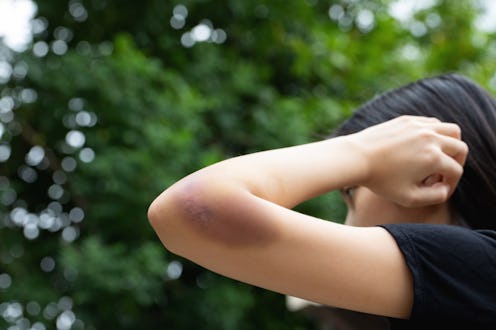Life
7 Science-Backed Ways To Make A Bruise Heal Faster

I’ve lost track of the number of times a friend has mentioned waking up with a mysterious bruise on her body. From a mystery discoloration on the leg after a fun night out, to a spot on the arm caused by accidentally hitting the doorframe (again!), we’re all familiar with those pesky black and blue (or yellow, green, and purple) marks.
Men and women’s different fat and skin compositions mean that women are generally more susceptible to bruises than men, often on their arms and legs. Most bruises occur after small blood vessels, or capillaries, close to the skin’s surface break from trauma, with blood leaking out of the vessels as a result. Men’s blood vessels tend to be protected by a thicker layer of collagen than women, meaning they’re less likely to get damaged and break in the first place.
Bruises do usually go away with time, and covering up a bruise with makeup is definitely an option, but for times when you’re feeling especially impatient with the healing process, there are some ways to potentially speed up healing and help minimize the appearance of a bruise. Ahead, find seven methods that may help make a bruise heal faster, or decrease your chance of getting one in the first place.
1Apply an Arnica-Infused Ointment
2Ice, Ice, Baby
Ice is a tried and true method to reduce swelling for a reason. Apply a covered ice pack to the bruised area for around 10 minutes and the application can help minimize swelling, reduce pain, and potentially make the bruise smaller.
3Elevate The Area
Similar to icing the area, you should elevate the bruised area as soon as you can. Elevating the injury can help prevent more blood from pooling in the area than necessary, New York City dermatologist Doris Day, M.D., told Self.
4Apply Heat
So 24 hours have passed, and you’re still cringing at that giant bruise. Consider a warm compress the yin to your ice pack’s yang. While cooling is the best choice after you first sustain an injury, after 24 hours, the application of heat can encourage more circulation in the affected area and help clear away pooled blood, Dr. Dena Nader told Reader’s Digest.
5Change Your Diet
Unsurprisingly, your diet can impact how your body heals and can potentially act as a preventative measure to reduce your risk of bruising. In a blog post, Dr. Anil Shah, a Chicago-based plastic surgeon, recommended Vitamin K-rich vegetables like cabbage, spinach, and kale that can help thicken blood and make it less likely to leak from blood vessels. He also mentioned pineapple, which is chock full of bromelain, a mixture of enzymes that have anti-inflammatory properties that can aid in reducing bruising and swelling.
6Bromelain Supplements
Speaking of bromelain, it also comes in supplements that have been linked to aiding with bruises. A 2017 study found that patients who took bromelain after the extraction of a third molar experienced reduction in swelling and pain post-surgery compared to a control group. Bromelain is available in 200 mg capsules, but be sure to consult with your doctor before taking any sort of supplement.
7Consider the Medications You’re Taking
If you’re plagued by constant bruising beyond what you think is normal, blood-thinning medications like aspirin and ibuprofen may be the culprits. These medicines may make you bruise more easily by making your blood pool more easily under the skin, according to the American Academy of Family Physicians. If you take these medications regularly, consult your doctor about the issue.
8
Whether you're chronically dealing with random bruises or just want to get rid of the occasional spot, these methods may help you on your quest. As always, make sure to talk to your doctor before taking any supplements or homeopathic remedies.